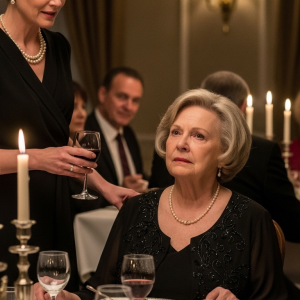I hurled the boy’s tattered backpack onto the dusty patch of grass in front of the house. It landed with a soft, pathetic thud. I looked at him, my eyes intentionally cold, completely empty of the warmth he used to search for. My voice was a shard of ice.
“Go away,” I said, the words leaving my mouth without a trace of hesitation. “You’re not my son. My wife is gone, and with her, any obligation I ever had to you. Go wherever you want.”
He didn’t cry. He didn’t beg. That’s what I had expected, what I had braced myself for. Instead, a profound and unnerving silence fell between us. He simply bowed his head, a gesture of quiet defeat that should have broken my heart, but didn’t.
He bent down, picked up his broken backpack, and slung it over one thin shoulder. He turned around without looking at me one last time… and walked away. Ten years later, when the truth was finally revealed, I would have given anything to turn back time, to scream for him to stop, to fall to my knees on that very patch of grass and beg for his forgiveness.
My name is Rajesh, and I was 36 years old when my wife, Meera, was stolen from me by a sudden stroke. She left behind a silence in our home that was louder than any storm. And she left behind Arjun, her 12-year-old son.
Arjun was not my blood. He was the living ghost of Meera’s past, a son from a relationship she never named. When I married Meera, I was 26. She was a woman who had already weathered the storms of abandonment and the quiet shame of a single pregnancy in a world that did not forgive such things.
At the time, I told myself I was noble. I saw her strength and admired it from a distance. I convinced myself that I was a good man for “accepting” another man’s child. But love that is built on a foundation of self-congratulation is not love at all. It is pride, and it is fragile.
I raised Arjun as a duty, a burden I carried with a sigh. He was a constant, quiet reminder that I had not been her first. And though I provided for him, he must have felt the coldness. Deep down, I think he always knew he was tolerated, not loved. He was always polite, quiet, and distant, a small shadow in the house we all shared.
When Meera died, the single thread connecting me to the boy was severed. The grief I felt was a selfish, isolating thing. It left no room for anyone else, least of all him.
A month after the funeral, in the suffocating silence of the home that was once hers, I finally broke. I looked at him, this child with her eyes but not my blood, and I felt nothing but a desperate need to erase him, to erase every part of her past that wasn’t about me.
“Get out,” I said. “Whether you live or die from this day on, I do not care.”
He just left. And as the sound of his footsteps faded down the road, I felt a wave of relief so profound it sickened me later. I felt free. I sold the house, purged every memory, and moved to another city. My life went on.
The years that followed were a testament to my ability to forget. My business prospered. I moved into a larger, modern apartment that held no ghosts. I met another woman—Anya. She was simple, uncomplicated, with no children and no painful past. She was a clean slate, and I clung to that.
For the first few years, I would sometimes think of Arjun. It wasn’t concern, not true guilt. It was a flicker of detached curiosity. Where did a 12-year-old boy go? How did he survive? Was he even still alive?
The questions were like stones dropped into a deep well; I heard the splash, but never cared to know what lay in the darkness below. Time, and a determined effort to build a new, unburdened life, eventually erased even that curiosity.
A 12-year-old boy, alone in the world. Where could he possibly go? I didn’t know. I didn’t want to know. I even remember a dark thought crossing my mind one evening, a glass of expensive whiskey in my hand: If he is gone… perhaps it was for the best. It was a monstrous thought, but it was mine.
Then, ten years after I had closed the door on him, the past came calling. It was a Tuesday afternoon. My phone rang, displaying an unknown number.
“Mr. Rajesh?” a polite, professional voice asked. “My name is Priya. I’m calling to personally invite you to the grand opening of the TPA Gallery on MG Road this Saturday. There is someone here who very much wants you to attend.”
I was about to dismissively decline, another charity event or business opening I had no time for. But the next sentence she spoke froze the phone in my hand.
“Don’t you want to know what happened to Arjun?”
My chest tightened as if squeezed by an invisible hand. I hadn’t heard that name—Arjun—spoken aloud in a decade. It felt like a name from another life, a ghost I had successfully buried. I stood motionless in my office, the city’s hum fading into the background.
After a long pause, I replied, my voice a carefully constructed mask of indifference.
“I’ll be there.”
The TPA Gallery was a stark, modern space of white walls and polished concrete floors. It was crowded with the city’s elite, their chatter echoing in the high-ceilinged room. I felt immediately out of place, an intruder in a world that was not my own.
The paintings that adorned the walls were striking. They were massive oil-on-canvas works, filled with a sense of coldness, of profound distance and unsettling emotion. They were beautiful but painful to look at. I drifted from one to the next, reading the small placards. The artist’s name was simply listed as TPA.
Those initials pricked at my memory, but I couldn’t place them. I was about to turn and leave, convinced this was some kind of mistake, when a voice cut through the noise.
“Hello, Mr. Rajesh.”
I turned. A tall, slender young man stood before me. He was dressed in simple, dark clothing that contrasted with the expensive suits around him. But it was his eyes that captured me. They were deep, familiar, and held an inscrutable calmness that seemed to see right through me. My blood ran cold. It was Arjun.
He was no longer the fragile, scared 12-year-old I had cast out. In his place stood a composed, successful man of 22. His face held the ghost of the boy I remembered, but it was overlaid with a decade of experiences I couldn’t even imagine. He was a stranger, yet agonizingly familiar.
“You…” I stammered, my voice failing me. “How…?”
He interrupted me, his voice perfectly calm, yet sharp as shattered glass. “I didn’t invite you here for a reunion. I just wanted you to see what my mother left behind. And what you chose to walk away from.”
He gestured for me to follow him. He led me past the crowds to a large canvas hanging on a secluded wall, covered by a rich red cloth. The air around it felt sacred, heavy.
“It’s called ‘Mother.’ I’ve never shown it in public before,” he said, his gaze fixed on the covered painting. “But today… I wanted you to be the first to see it.”
With a trembling hand, I reached out and lifted the corner of the cloth.
There she was. Meera.
She was lying in a hospital bed, her face pale and fragile, her beautiful hair fanned out on the pillow. The artist had captured her vulnerability, her ethereal beauty even in sickness, with a love that was breathtaking. In her hand, she was clutching a small, framed photograph. It was a picture of the three of us, taken on the only family trip we had ever taken.
My legs gave out. I stumbled back against the opposite wall, gasping for air. Arjun’s voice continued, steady and unwavering, a stark contrast to the storm raging inside me.
“She kept a diary in the last few months of her life. She hid it in an old box in the attic. I found it a week after you… asked me to leave.” He paused, choosing his words with care. “I always knew you didn’t love me. But my mother, she always believed that one day you would understand. She thought your heart would eventually see the truth.”
He took a step closer, and his next words shattered my world into a million pieces.
“Because… I am not another man’s son.”
I stopped breathing. The sounds of the gallery, the people, the city—everything vanished. There was only the painting of my dead wife and the impossible words of the young man standing before me.
“What… what are you saying?”
“I’m saying I’m your son, Rajesh,” he said, using my first name like a blade. “She was already pregnant with me when you met. But she was terrified. She told you I was someone else’s child… to test you. To see if you could love her for who she was, not just for the child she carried. And then… she said it was always too late to confess. She was afraid the truth would make you feel trapped by duty.”
The world tilted on its axis. I had thrown out my own son. My own flesh and blood. I had cast him out into the world with a curse, convinced he was a symbol of my wife’s past, when in reality, he was the only living piece of our future.
He now stood before me—poised, dignified, successful—while I… I had lost everything. I had lost my wife to fate. And I had lost my son to my own pride. I had lost him twice. And the second time… the second time was forever.
I collapsed onto a small bench in the corner of the gallery, my head in my hands, utterly devastated. Arjun’s words echoed in the ruins of my soul. I’m your son. She was afraid you’d only stay out of duty. She chose silence because she loved you.
I had always prided myself on my “nobility” for accepting another man’s child. But I was never noble. I was never kind. I was never a father. And when Meera died, I threw her son—our son—away like he was nothing.
I looked up, my eyes blurry with tears I hadn’t shed in a decade. I tried to speak, to form an apology, but Arjun was already turning away, his duty done. I scrambled to my feet and ran after him, grabbing his arm.
“Arjun… wait! Please! If I had known… if I had only known you were mine—”
He stopped and looked at me. His expression wasn’t angry. It was something far worse: it was distant. Calm. “That’s the point,” he said softly. “It shouldn’t have mattered.”
“I didn’t bring you here for your apologies,” he continued, gently removing my hand from his arm. “I don’t need your acknowledgment now. I just wanted you to know the truth. My mother didn’t lie to you to deceive you. She hid the truth to protect you, to give you the freedom to choose love without obligation.”
He handed me a thick, leather-bound envelope. “These are copies of the relevant pages from her diary. I thought you deserved to hear it from her.”
He looked at me one last time. “I don’t hate you, Rajesh. In a strange way, I should thank you. Because if you hadn’t thrown me away… I might never have had to find the strength to become who I am today.”
With that, he walked away and disappeared into the crowd, leaving me alone with the ghost of my wife and the truth of my monstrous failure. Later that night, in my silent apartment, I opened the envelope. In Meera’s shaky, elegant handwriting, the words flowed across the page:
“My Dearest Rajesh, If you are ever reading this, please forgive my cowardice. I was so afraid. When we met, I was already carrying our son. I wanted to tell you from the moment I knew, but I saw the hesitation in your eyes when I spoke of the future. I was afraid you would only love me for the child.
So I invented a story, a test for your heart. I hoped that if you could learn to love him, truly love him as your own, then the truth of his blood wouldn’t matter. But that day never came. And my silence grew until it was a wall between us. Arjun is our son. Our beautiful boy. Please, if you read this after I am gone, love him for both of us.”
I wept. I wept for the woman whose love I had never truly understood. I wept for the boy I had abandoned. I wept for the man I had failed to be. I was a husband who had failed his wife and a father who had failed his son. And now… I had nothing.
In the weeks that followed, I tried to fix the unfixable. I ended my relationship with Anya the next day. It wasn’t her fault, but I couldn’t build a future on a foundation of lies and cowardice. My life now had a single, all-consuming purpose: Arjun.
I began to orbit his life like a distant, penitent moon. I sent him texts that went unanswered. I waited outside his gallery, not to confront him, but just to be near, to catch a glimpse of the man he had become. I wasn’t seeking forgiveness. I knew I hadn’t earned it. I just wanted to be close to him.
One day, he finally agreed to see me. We met at a small coffee shop. His voice was softer than it had been at the gallery, but still firm.
“You don’t need to do this, Rajesh. You don’t need to atone.”
“Yes,” I choked out. “I do.”
“I don’t blame you anymore,” he said, looking into his cup. “But I also don’t need a father. The one I had chose not to need me. I learned to be my own father a long time ago.”
His words were true, and they were fair. I nodded, accepting the painful reality. I slid a bank book across the table. It contained my life’s savings.
“I can’t take back the past,” I said, my voice thick with emotion. “This is everything I have. Please, take it. Do with it what you will.”
He pushed it back toward me. “I don’t need your money.”
“I know you don’t,” I insisted. “This isn’t for you. It’s for me. If you allow me… I want to be by your side. In silence. Without titles, without demands. Just knowing that you’re okay… that will be enough for me.”
Arjun looked at me for a long, searching moment. I saw a flicker of the boy he once was, a flicker of pain, before the calm composure returned.
Finally, he nodded slowly. “I’ll accept it,” he said. “Not for me. And not for the money. But because my mother always believed that underneath it all, you could still be a good man. I’ll do it for her.”
That was the beginning. I was no longer his “father.” I was a silent guardian, a ghost in the background of his life. I used my years of business contacts to help him, making anonymous recommendations to collectors, arranging for his work to be seen by influential critics. I couldn’t get my son back, but I refused to lose him again.
Every year, on the anniversary of Meera’s death, I would go to the temple and kneel before her photo. And I would weep, whispering the same words: “I’m sorry, Meera. I was a fool. A selfish, proud fool. But I will spend the rest of my life trying to be the man you always believed I could be.”
The year Arjun turned 22, he was invited to a prestigious international art exhibition in London. On his professional social media page, he posted a photo of his featured painting with a single line: “For you, Mom. We did it.”
My heart ached with a mixture of pride and sorrow. I was about to close the page when a private message notification popped up. It was from him. The first direct contact in months. My hands trembled as I opened it.
The message contained only a few words, but they were the words that began to heal a decade of pain.
“If you’re free… the exhibition opens this Saturday. I’ve left a ticket for you at the door.”
It wasn’t forgiveness, not completely. It wasn’t a return to a past that could never be. But it was an invitation. It was an opening. It was the end of all the pain, and the quiet, humble beginning of something new.




